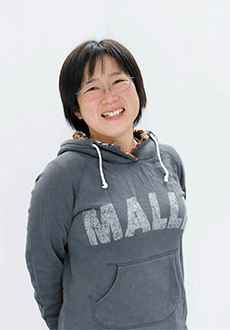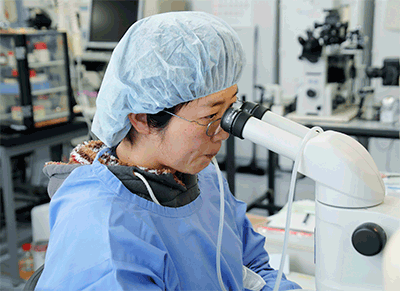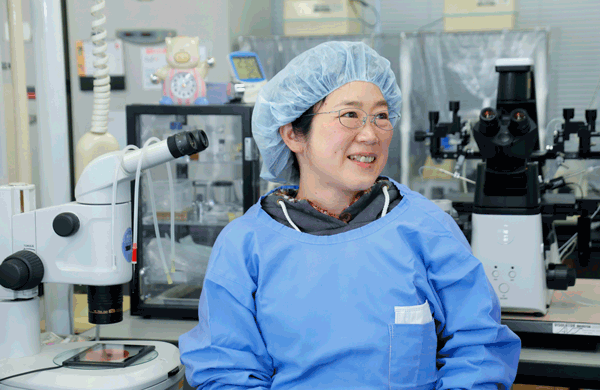Even people who aren’t good at science can become researchers. If you have an interest, just go for it (Narumi Ogonuki, Senior Technical Scientist)

Many women active in a variety of fields work at RIKEN BRC. We interviewed 12 of these women for their insights on how they continue to flourish with work styles that fit their particular lifestyles.
In this interview, we talked with Narumi Ogonuki, a Senior Technical Scientist in the Bioresource Engineering Division.
She never felt that she did well in math and science in school, but her dreams and enthusiasm encouraged her to go to a science university. Ogonuki was enthralled by the beauty of the ovum, and has continued to engage in research on ova from her university days all the way up to the present. She spoke to us about her thoughts on work, motivation, and hopes for the future, among other topics.
Profile
- Narumi Ogonuki
- Senior Technical Scientist, Bioresource Engineering Division
- Ogonuki’s interest in the beauty of the oocyte led her to study developmental engineering in her university days. In 2002, she joined RIKEN, and has continued to pursue research on the theme of developmental engineering research using micro-insemination techniques. She is in charge of the development of micro-insemination techniques in the laboratory.
My fascination with the beauty of the oocyte has sustained my research into the same topic for over 20 years.
My interest in becoming a researcher was first sparked by a craving I had when I was in middle school. I figured if I could make a bigger chicken, then I could eat a bigger fried chicken!
I suddenly realized that I could just become a researcher and make it myself, and this was the start of my interest in research as a career. I was disappointed when I realized shortly thereafter that it wasn’t possible to make a bigger chicken, but my interest in carrying out experiments didn’t change.
I was able to make up for my less-than-stellar performance in math and science with sheer enthusiasm, and went on to a science university. I wasn’t sure what field I wanted to major in shortly after I started university, but I was really inspired by a lab involving in-vitro fertilization of a mouse when I was in my second year. This convinced me to choose developmental engineering. The oocyte itself and the image of the sperm swimming without sight toward the oocyte is just magical and incredibly beautiful.
I have continued my research on fertilization from that point on. Almost all researchers with a long career switch themes at least a little in the course of their careers, so my case was quite unusual.
Even after more than 20 years, I haven’t gotten tired of looking at oocytes and sperm, and am struck again every time by their beauty. I feel very lucky that I’ve been able to continue research into a topic I like.
I am accepted exactly as I am, which means that I can live a stress-free life as a researcher.

My boss in a previous job contacted me, and this led to an interview at RIKEN. I had the image that everyone at RIKEN was really smart, so I was worried about whether I would be up for it.
But we can’t pretend to be something we’re not in an interview, so when I was asked why I chose this profession, I was honest and told them my idea about a bigger fried chicken. Luckily, they laughed and found it interesting. The atmosphere was more relaxed than I had expected, and I was really happy to see that they accepted people with all kinds of ideas. After I joined RIKEN, my initial anxieties proved to be baseless because I was lucky in both the environment and personal relationships. There is still nothing here that gives me stress, and I carry on my research with real pleasure.
Also, I really like mountains, and often go mountain climbing, camping, and trail running, and participate in adventure races on my days off. I am very grateful that my coworkers are understanding about these slightly unusual hobbies and support me. I think this acceptance of me just as I am in the workplace is another reason that it is so easy to work here.
Even people who aren’t good at science can become researchers. If you have an interest, just go for it.
Research is a profession in which even mistakes lead to results. You are not asked to just produce good results—mistakes are also recognized for what they are. This is an amazing aspect that is lacking in other professions, and makes me feel very lucky.
People who are considering going into research in the future should take up this challenge if they like the field, even if they are not particularly good at it. It’s such a waste to give up on an interest in biology just because you’re not good at math! In fact, my brain was not particularly science-oriented, but my desire to learn more got me this far, and I produce real results. I take the more optimistic view that precisely because I’m not a genius, I am struck by ideas that a genius would not have, and this gets me through my research every day.
Even if you struggle with math right now, you can get through it with the help of the Internet and computers and all of our other modern conveniences. I hope that you can make good use of every helpful tool and find your own path to becoming a researcher.
My own personal goal going forward is to enjoy both my work and my personal life. There’s that moment when my experiment goes more smoothly than the previous day, or I can see Skytree with the nice weather today—if I can have even just one of these little moments every day, my life feels rich.
